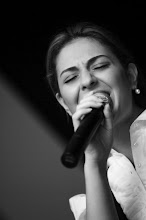As a child, he heard only church music, but the sounds of Duke Ellington turned him to jazz. He toured with Louis Armstrong played with Lionel Hampton and was briefly a member of Ellington's band, but his explosive temper got him personally fired by Ellington.
In the early 1950s, Mingus played with Charlie Parker, who inspired and influenced him. Mingus considered Parker the greatest genius and innovator in jazz history, but hated his drug use and behavior.
In 1952 Mingus co-founded Debut Records to record young musicians. The most famous recording of his label, though, is the Massey Hall concert with Dizzy Gillespie, Charlie Parker, Bud Powell, and Max Roach on May 15, 1953,
1956 was a breakthrough year for him, with the release of Pithecanthropus Erectus, a ten minute jazz poem about the rise and fall of man. Mingus then went on to record an amazing thirty albums in ten years.
Mingus couldn’t be labeled, as a person or as a composer. His music contained influences of classical music as well as gospel music. His pieces contained long solos of improvisation and were played differently each night. He was always exploring new areas of jazz. taking cures from bebop and building from there.
One of Mingus’ greatest contributions to jazz is his organizational genius. Mingus carefully cultivated his ensembles, usually 8-10 people. Mingus pushed his ever-rotating groups hard, insisting on dynamic interaction and on-the-spot creations. These groups became known as “University for Jazz”. Like Duke Ellington, Mingus would write pieces for specific members of his group. But, also, he could swiftly fire members, sometimes on stage in the middle of a performance.
As respected as Mingus was for his musical talents, he was sometimes feared for his occasional violent onstage temper, which was at times directed at members of his band, and other times aimed at the audience. He was physically large, prone to obesity (especially in his later years), and was by all accounts often intimidating and frightening when expressing anger or displeasure. Mingus was prone to clinical depression. He tended to have brief periods of extreme creative activity, intermixed with fairly long periods of greatly decreased output.
Mingus’ personality was as feared as his music was respected. Frantic periods of cerativity could eb followed by dark depressions. His anger could be directed at fellow musicians or even at the audience. Mingus would often tell listeners to stop eating and drinking or call for no cash register work during the performance. Mingus felt strongly about civil rights and spoke fearlessly from stage, channeling his anger into politics.
But he also had an ironic sense of humour which can be seen in such song titles as All Things You Could Be By Now If Sigmund Freud's Wife Was Your Mother. Or The Shoes of the Fisherman's Wife Are Some Jive Ass slippers.
Epitaph is one of Charles Mingus' masterpieces. It’s 4,235 measures long, requiring two hours to perform, almost like a jazz opera and one of the longest jazz pieces ever written.
Mingus’ music is difficult to describe. Jazz is music to be lived and listened to and performed. So we suggest you listen to II B.S. (one of my all-time favorites).


































No comments:
Post a Comment